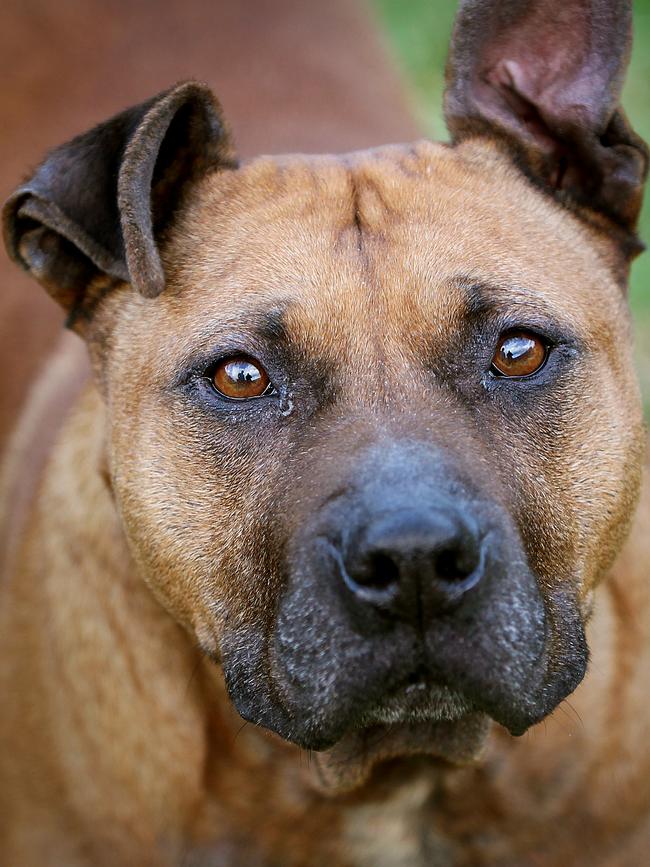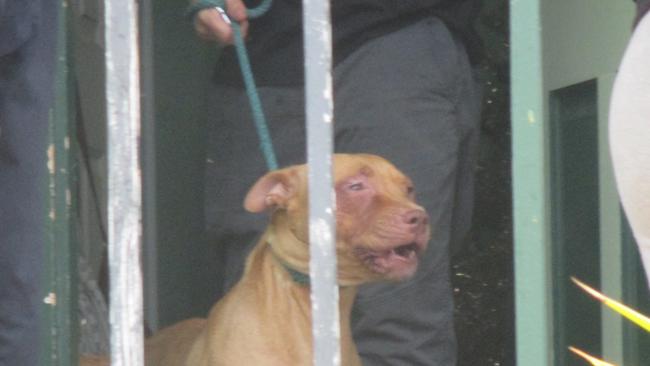What vets say makes for dangerous dogs and needs to happen to prevent attacks
A peak vet body has weighed in on growing talk about banning certain dog breeds, following a spate of horror attacks.
Victoria
Don't miss out on the headlines from Victoria. Followed categories will be added to My News.
Australian vets have renewed their opposition to any blanket ban on so-called ‘dangerous dog breeds’ in the wake of a recent horror attack by two rottweilers on their loving owner, but say more education about pet ownership and canine contact is urgently needed.
President of the Australian Veterinary Association (AVA) behaviour special interest group, Dr Isabelle Resch, on Tuesday told the Herald Sun education about dogs should be part of Victorian schools’ core curriculum so that all children learnt how to behave around them.
Providing some free training to rescue dogs at Victorian shelters and ongoing support to the people adopting them would also be helpful, she said.
Private one-on-one dog training can cost upwards of $100 an hour, making it out of the reach of many families, as cost of living bites.


“Doing some training programs with prospective (rescue dog) owners would be a positive move, but it’s not that simplistic . . . training would be a positive thing for all dogs not just shelter dogs . . . more than that, one of the greatest things needed is school education,” Dr Resch said.
“We need to be teaching our children and we need to be teaching parents about their children’s interactions with dogs. We need to be doing a whole lot more education at the community level about how to interact safely with pets and dogs.”
A Responsible Pet Ownership program, aimed at five to 12 year-olds, is currently available to Victorian schools and kindergartens but is of an ad hoc and often singular nature.
There are also dog education resources available to schools, kindergartens and Victorian families.
But Dr Resch said much more was needed, more consistently, through schools and in the community, to keep people safe.
Perth woman Nikita Piil, 31, was attacked by her pet dogs, Bronx and Harlem, at her home on September 16 and had to undergo complex surgery to save her arm.
Since then she has developed serious bacterial infections as a result of the dog bites.
And in April this year a Melbourne nurse in her 60s had her ear ripped off in a dog attack in Bulleen, when a 50kg bull Arab cross pounced and then dragged her on to a busy road.
Just this week a 10-year-old boy was rushed to hospital after an attack by a pet dog in South Australia.

The AVA said it supported improving dog laws to better protect the community and to promote responsible pet ownership, but did not back recent calls in Australia and overseas to ban specific dog breeds.
In Victoria, legislation empowers councils to declare a dog to be ‘dangerous’ if the dog has caused serious injury or death to a person or animal, if the dog is considered ‘menacing’, if the dog owner haS received at least two infringement notices for failing to comply with restraint requirements and if a dog has been declared dangerous under corresponding legislation in another state or territory.
Owners of restricted breed dogs can be jailed for up to 10 years if their dog kills someone, or for up to five years if their dog endangers someone.
Pit bull terrier type dogs had been banned in Victoria in the past, leading to a parliamentary inquiry and the eventual overturning of that legislation, the AVA said.
There are currently no banned dog breeds in Victoria but five restricted dog breeds that cannot be legally imported.
These dogs have not necessarily attacked a person or animal, but are declared restricted based solely on their breed.

An average of almost eight dog attacks occur across Melbourne each day, figures revealed this year.
Data obtained by the Herald Sun in April this year showed there had been at least 2826 reports of vicious attacks, including rushings (snarling and coming close to a person), in the 12 months before — with Casey suburbs including Cranbourne, Berwick and Narre Warren, hotspots for incidents. About 134 of them were prosecuted in court.
Dr Resch said breed-specific approaches to dog regulation were not an effective way of protecting the public from dog bite incidents
Dog bites were complex and caused by a combination of genetic factors, the learning and experience of the dog, pain and medical issues and the environment they lived in — not simply due to their breed, Dr Resch said.
Banning certain breeds would not work to reduce dog attacks because, on its own, was “not an effective indicator or predictor of aggression in dogs”, and the breed of dogs could not be precisely determined by their appearance or by DNA analysis.
It also “ignored the human element” whereby people who wanted a particular type of dog would simply substitute another breed of dog of similar size, strength and perception of aggressive tendencies, she said.
“A ‘deed not breed’ principle needs to be applied, which asserts that aggression in dogs is not tied to any particular breed, but is influenced by various individual factors and circumstances, not breed alone,” Dr Resch said.
The AVA was calling for a multi-pronged response to reduce incidents of dog attacks that would include legislation that allowed the identification of individual, potentially dangerous dogs and measures to prevent them from inflicting harm, as well as education programs — particularly for children — and dog owners in lower socio-economic areas.
“There is a significant gap in community knowledge about how to live alongside and interact with animals, particularly dogs. This lack of understanding can lead to unsafe interactions and increase the risk of dog attacks,” Dr Resch said.
“The importance of being proactive rather than reactive when it comes to addressing dog behaviour issues cannot be overstated. We believe that governments’ attentions should be focused on prevention rather than consequences,” Dr Resch said.
A Victorian government spokesperson said Animal Welfare Victoria had a variety of free resources available on its website about responsible pet ownership, how to reduce the risk of dog related injuries as well as information about school education programs.
About $7 million had been allocated over the next four years to the Animal Welfare Fund in the Victorian Budget 2023/24.
Pet educators and their trained dogs visited more than 2000 kindergartens and primary schools in Victoria each year to promote safety messages through animated presentations, songs and role play, a spokesperson said.
In Victoria, a dangerous dog was one a local council had declared to be dangerous because it had bitten or attacked a person or animal, causing serious injury or death, she said.
RSPCA Victoria — that operates most of the state’s shelters — said it offered a free dog behaviour helpline to support pet owners.
The helpline was staffed by dog behaviour experts who advised owners on common issues concerning dog behaviour, including excessive barking, over-excitability, and reactivity to other animals, a spokesman said.
The service was open to all Victorians, with video consultations available, he said.
“We also offer a paid service called Good Pet Behaviour which is led by Dr Gabrielle Carter, one of only three Veterinary Specialists in Animal Behaviour in Australia,” the spokesman said.
“Good Pet Behaviour helps pet owners deal with more complex pet behaviour challenges. Services include physical and mental health assessments, behaviour modification strategies and customised treatment plans that suit each pet and their family’s needs.”




